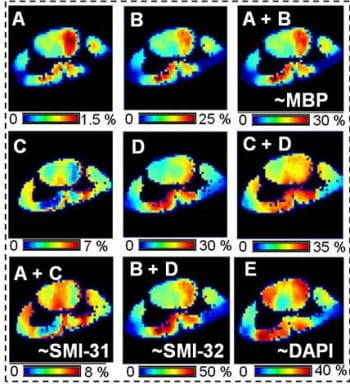
Sheng-Kwei (Victor) Song, PhD
Professor, WashU Radiology
- Phone: 314-362-9988
- Email: ssong@nospam.wustl.edu
Development of non-invasive imaging of central nervous system white matter

Quantification of White Matter Injury using Diffusion Tensor Imaging:
Myelin loss and axonal damage are both observed in white matter injuries. Each may have significant impact on the long-term disability of patients. Currently, there does not exist a non-invasive biological marker that enables differentiation between myelin and axonal injury.
Diffusion tensor imaging (DTI) has been widely applied in the CNS for detailed analyses of tissue morphology and pathology. The primary parameters accessible from DTI, the directional diffusivities, are often combined into summary parameters sensitive to tissue pathology and morphology. However, such parameters lack specificity to detect and differentiate axon vs. myelin degeneration.
His research lab has taken a different approach to analyze DTI parameters for detecting and differentiating axon vs. myelin degeneration in various mouse models of white matter injury. Dr. Song hopes to translate our animal findings into clinical settings. Current studies include the following:
- Examination of demyelination and remyelination of mouse CNS white matter using in vivo DTI.
- Quantification of white matter injury in mouse model of experimental allergic encephalomyelitis (EAE) on various genetic backgrounds for mechanistic studies.
- Evaluation of evolving white matter injury in mouse model of spinal cord injury using in vivo DTI.
- Understanding effect Alzheimer’s disease on CNS white matter using transgenic mouse models and in vivo DTI.
- Quantification of white matter in mouse model of retinal ischemia using in vivo DTI.
- Evaluation of disease progression in multiple sclerosis (MS) patients.
More about Sheng-Kwei (Victor) Song